The global equity markets continued to decline on concerns that oil prices have surged by around 30% over the past three months, increasing concern about higher rates for longer, and the health of consumer spending. The global equities markets fell by 0.88%, outperforming the global fixed-income markets which also fell by 0.93%. Most major markets fell with the European and the Chinese markets declining by 1.38% and 1.27% respectively, while the US markets fell by 0.6% on concern that the elevated borrow costs would have an impact on 1H24 earnings. The global fixed income fell mainly due to continued reaction to the Fed’s hawkish commentary and fear of a US government shutdown.
Figure 1: Major Indices Performance
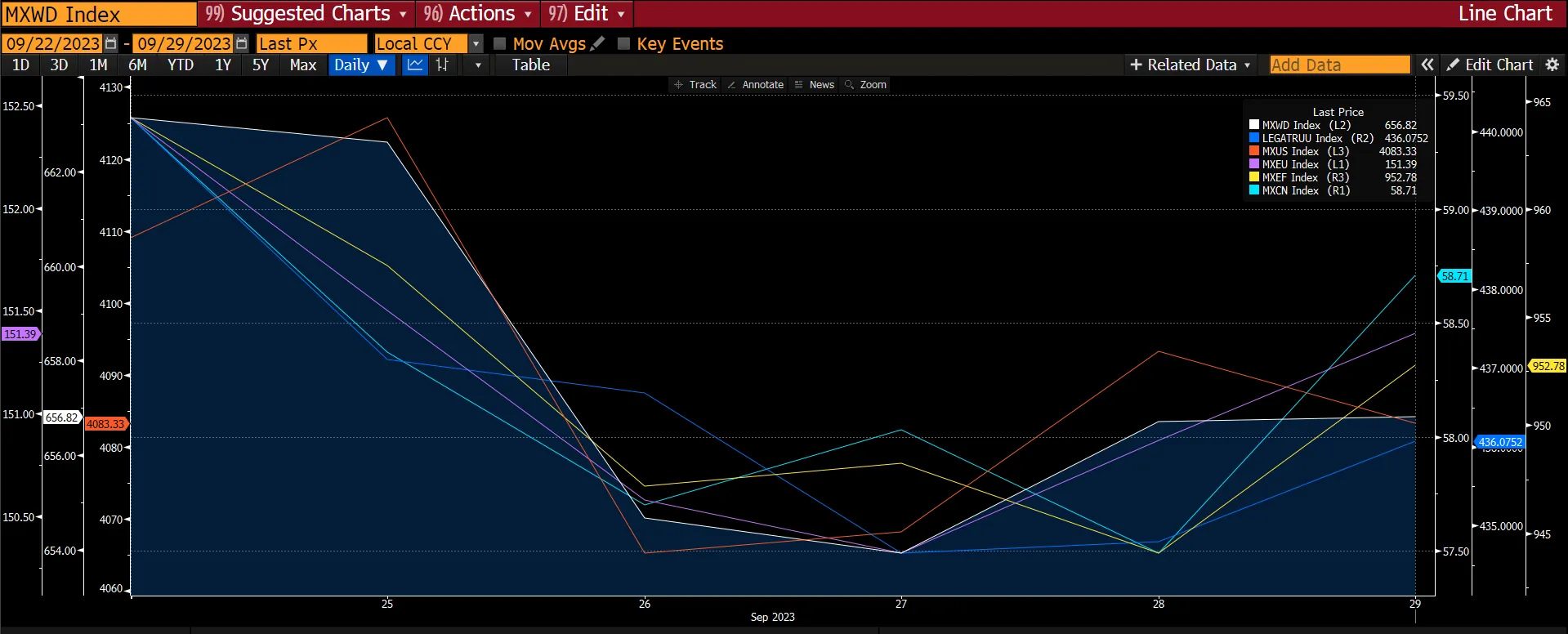 Source: Bloomberg
Source: Bloomberg
Focus Topic – Oil Surge
Oil has risen as a tightened market outweighed gains in the dollar and a broader risk-off tone driven by the outlook for higher interest rates. Global oil prices have been ripping, rising 30% over the past three months amid production cuts in Saudi Arabia and Russia, and this has triggered concerns about the trajectory of risk assets.
Figure 2: Oil Resume Rally
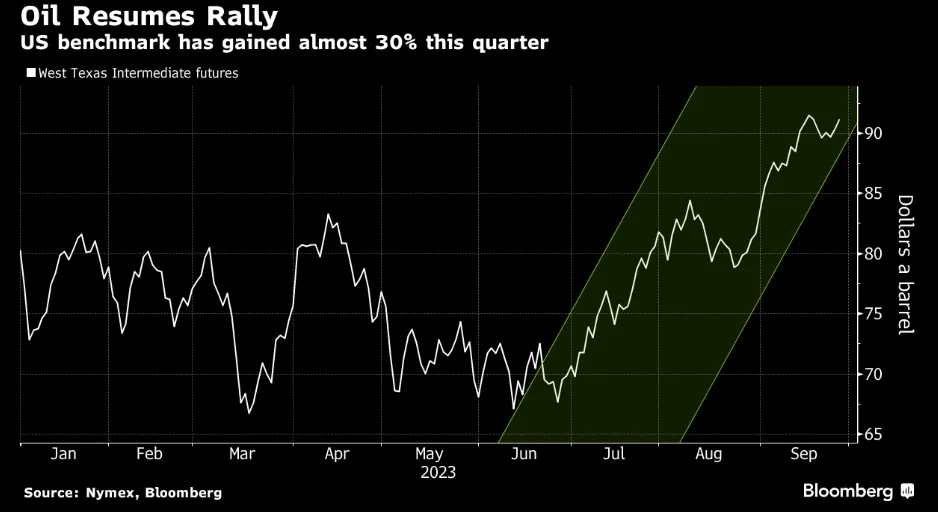
Beyond supply concerns, this oil price rally reflects resilient demand, particularly from China. According to Bloomberg, oil’s fundamentals are still strong, with no substantial bearish drivers but traders will be monitoring macro headwinds and risk-off sentiment in equities where “trading remains in correction mode, with no risk yet that crude will plunge.” Furthermore, we are seeing analysts raising their oil price targets to about $100 per barrel. The driver of their revisions is reduced OPEC supply and greater demand will offset greater US supply. However, they also believe that Brent will be range-bound between $80-$105 per barrel through 2025, suggesting that most of the oil price rally could be behind us. Along with the tight supply, the hurricane season (albeit soon over), and we expect a colder winter this year compared to last year (particularly in Europe) driving higher demand for gas and oil, we therefore see oil prices continue to remain resilient, albeit that upside could be limited.
In its September report on the oil market, the International Energy Agency lowered its supply deficits for the third and fourth quarters of the year to 1.4m barrels per day (bpd) and 1.1m bpd respectively. Futures are set for their biggest quarterly jump since early 2022 as OPEC forecasts a shortfall of as much as 3m barrels per day from October on the back of supply cuts by Saudi Arabia and Russia. While the rally has rekindled talk of $100 crude, the gains have stalled over the past week as analysts have warned that the cartel and its allies may need to extend the curbs next year to keep prices from falling.
What does this mean for the economy and equities?
In September, Brent oil prices rose 10%, US 10-year yields rose 50bp to 4.6%, European equities fell 4% and the S&P 500 fell as much as 5%. Since the Global Financial Crisis, though, the equity/oil correlation has generally been highly positive, as higher oil prices have reflected a stronger macro backdrop and inflation pressure, in a world threatened by deflation and lacklustre growth. Correlations turned negative in the post-Covid world, especially in 2H22 when falling commodity prices eased recession concerns and triggered a rally in risk assets.
Figure 3: Key Agencies’ Supply And Demand Forecasts
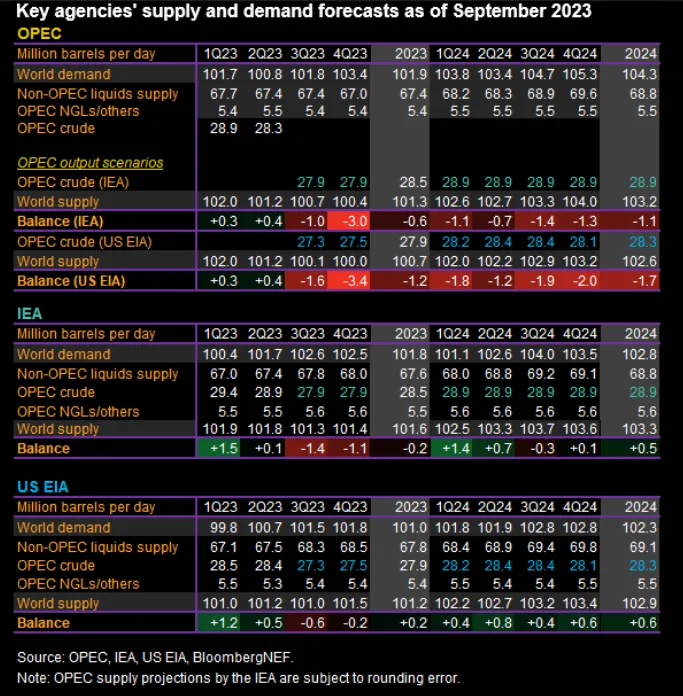
Global Energy stocks have returned +2.7% during the past month alongside higher oil prices. The Energy sector has generally tracked the price of crude oil this year. With oil prices expected to continue to trend upward, we believe energy stocks would too. The sector trades at a PER of 8.8x compared to the 5-year historical average of 22x. Moreover, Energy firms have focused on returning cash to shareholders as profits have surged. The total cash return yield of Energy equals 8.5%, well above the S&P 500 (3.7%). The combination of low valuations, high shareholder returns, and the outlook for firm oil prices suggests Energy equities should outperform going forward. However, we believe the upside will be modest in the near term, as investors will have to balance the potential benefit to Energy stocks from higher oil prices with the potentially higher recession risk due to the inflationary impact of rising oil prices.
Outside of the Energy sector, higher oil prices do represent a headwind to consumer stocks and companies that use oil as a major input. Higher oil prices act as a tax on the consumer and lead to less spending on other discretionary purchases. Higher oil prices also create input cost pressures for many companies. Thus Airlines, Construction Materials, and Air Freight and Logistics typically lag the most of any industry when oil prices rise by 5%+ in a month.
Figure 4: Equities and Oil Prices Positive Correlation
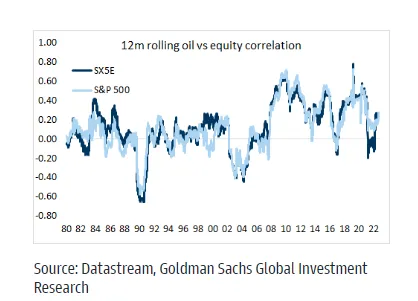
Figure 5: Global Energy Stocks Have Closely Tracked The Path Of Crude Oil Prices
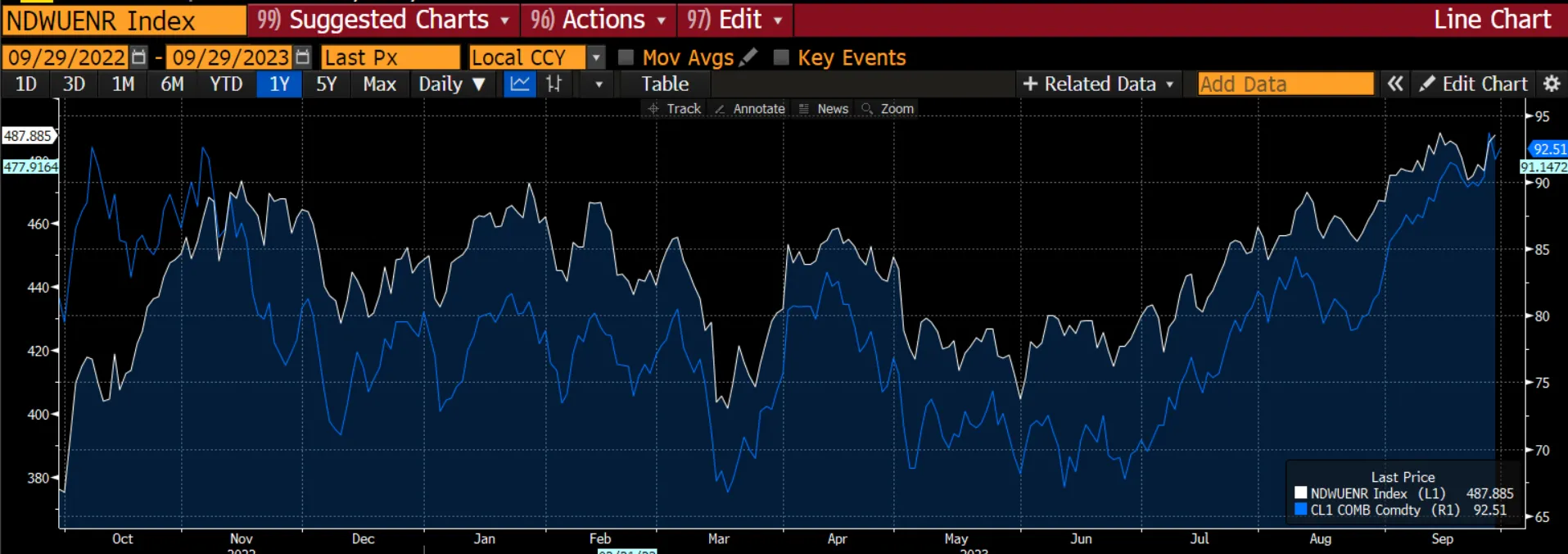 Source: Bloomberg
Source: Bloomberg
According to Goldman Sachs, recent energy price changes could be a slight net positive for European profits. On the positive side, a 10% rise in oil prices tends to add about 2.5pp to SXXP annual EPS growth and about 10bp to net income margins. If the Euro continues to depreciate against the USD, as markets reprice a hawkish Fed to tackle inflation, this also boosts STOXX Europe 600 earnings (+2.5pp to annual SXXP EPS growth for a 10% appreciation in EURUSD). However, on the negative side, weaker economic growth should weigh on European equities, which are highly sensitive to growth.
In the US, GS economist estimates that recent energy price changes will lower GDP growth by 0.3% annualised over the next two quarters. In Europe, a persistent 10% supply-driven oil price increase usually reduces Euro area real GDP by about 0.25% after one year. Based on their sensitivities of SXXP EPS to GDP growth, this could knock about 3pp off SXXP annual EPS growth. Consensus is expecting SXXP earnings to grow by about 5% in 2024.

